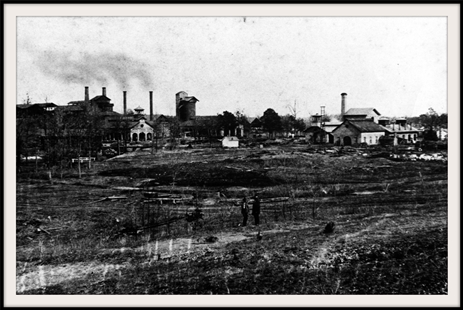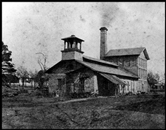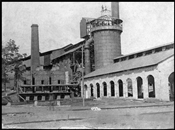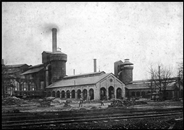Brief History of Shelby Iron Company
"Beginning of Operation Dates Back to Year 1846"
Few enterprises in Shelby County Alabama have made so
much interesting history as
the Shelby Iron Company at Shelby, Alabama. The article below is
furnished
The Shelby County Reporter, dated Thursday, February 21, 1929,
by J.G. Hendrick, who for several years had been connected with the
company
(with my personal inserts)
The history of Shelby Charcoal Iron dates back to 1846,
when the first blast furnace was started in 1844 and completed within two years.
This furnace stack was only thirty feet high and built of brick and stone. It's
capacity was limited to about five tons of Coldblast Iron per day.
(Horace Ware purchased land
from Green B. and Sarah Seale on December 29, 1842, filed January 19, 1843 in
Shelby County Alabama Deed Record 1842-1847, Page 18-19.)
This plant was burned in 1854 and was rebuilt by the
owner, Horace H. Ware. In 1854 a small puddling furnace was erected on the banks
of Camp Branch Creek, three miles west of Shelby. At this plant, Shelby iron was
made into wrought iron bars, a shipment of which went to Sheffield, England and
made into cutlery, receiving the highest endorsement of English steel
manufacturers.
A rolling mill of ten tons capacity was erected in 1860.
This mill manufactured Merchant iron and from it, the first cotton ties made in
the South were produced and later armor plates were made, some of this material
going into the building of Confederate gunboats "Tennessee" and "Merrimac."
(This was the first rolling mill in Alabama, and on April 11, 1860 they turned
out Alabama's first finished bar iron.)
During the Civil War practically all the output of
pig-iron, bars and armor plates were sold to the Confederate Government and in
order to secure a maximum tonnage, enlisted men from the Confederate army were
sent here to assist in operating the plants.
(In April 1862 Shelby Iron Company
signed a contract with the Confederate Government to deliver 12,000 tons of iron
annually. Almost all iron produced here were delivered to the Confederate Naval
Works at Selma, Dallas County Alabama. In February 1863 the entire output of the
rolling mill was requisitioned for gunboat plates. The relationship between the
Confederate Government and Shelby Iron Company was seldom friendly. At the end
of the war the Confederate Government owed $261,147.89 to Shelby Iron Company.)
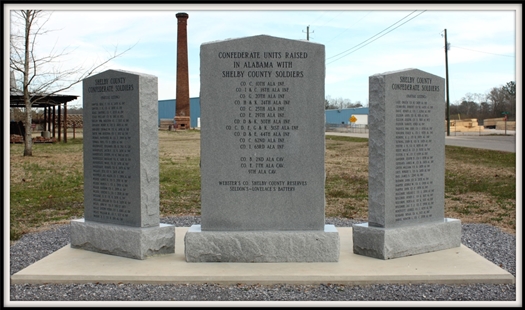 THIS MONUMENT ERECTED AND DEDICATED IN THE
SEQUECENTENNIAL YEAR OF 2013
THIS MONUMENT ERECTED AND DEDICATED IN THE
SEQUECENTENNIAL YEAR OF 2013
[DEDICATION WAS HELD JUNE 29, 2013]
IN HONOR
SHELBY IRON COMPANY AND BRAVE CONFEDERATE SOLDIERS OF SHELBY COUNTY
BY SHELBY IRON WORKS CHAPTER #2653 U.D.C.
AND CAPT. WILLIAM HOUSTON SHELBY CAMP #1537 ALABAMA DIVISION S.C.V.
In 1863 a much larger furnace stack was built with
capacity of around thirty tons of pig iron per day. This furnace was in
operation until some time in 1865, when the rolling mill and woodwork of the
furnace was burned by Col. Black of the U.S. Army at the time of "Wilson's
Raid."
(The Civil War ended for Shelby
Iron Company. On that date, a detachment of General Emory Upton's Division of
Wilson's Calvary Corps was sent to end the iron making capacity of Shelby Iron
Company on March 31, 1865.)
The plant was rebuilt in 1868. (It
was completed in February 1869 and during the following years, rail car wheel
iron became their most important product.)
Up to 1862 the company was operated under the corporation
name of Shelby County Iron Manufacturing Company being changed at that
time to the Shelby Iron Company.
(The Shelby Iron Company came into
existence by an act of incorporation of the Alabama legislature in February
1858. Shelby Iron Manufacturing Company was the name given to the new
corporation. The property included 5,000 acres of land, purchased in 1841 by
Horace H. Ware in Shelby, Shelby County Alabama.)
In 1873 work was started on a larger furnace, with
capacity of about seventy five tons. This stack was completed in 1875.
The second furnace of like capacity was completed in
1889, both of these furnaces equipped with hot blast stoves for superheating the
air blast before it entered the stack and making what is known as "Warm Blast
Charcoal Pig Iron."
Captain T.G. Bush of Mobile was made president of the
Company in 1890, serving in that capacity until his death in 1909, when Mr. Ward
W. Jacobs of Hartford, Connecticut was made president, his term of office
extending into 1914 when he was succeeded by Mr. Morris W. Bush of Birmingham,
Alabama.
The Birmingham News, Thursday, August 23,
1923. COMPANY SHUTS DOWN. - COLUMBIANA, ALA., Aug. 23. - Special. -
Shelby Iron Company, one of the oldest iron makers in Alabama, closed down their
large furnace at Shelby, in this county, Wednesday. They also closed down all of
their operations, charcoal and ore beds. The company started up their furnace
about six months ago, with the promise that they would stay in operation for
about sixty days, but instead they remained in blast for six months. It is not
known just when they will go in operation again, as there is no promise as to
this. When this concern shuts down it affects a large territory in this county.
Outside of their iron making they have a large wood and charcoal business, which
gives employment to a large number of people all over the county.
(When Shelby Iron Company ended
production on August 22, 1923, Shelby County Alabama, at that time, lost its
leading industrial concern. It had operated exclusively on charcoal fuel, was
the largest charcoal iron furnace in the United States, and was the longest
operating charcoal furnace in the United States. It was known as "The Queen
of American Charcoal Iron Furnaces".)
In Memory
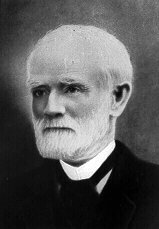
Horace H. Ware, Founder of Shelby Iron Works, born April 11, 1812
in Lynn, Massachusetts, the only son of Jonathan Ware and Roxanna Howe.
Horace H. Ware became known as "the father of iron and steel in
Alabama."
He died on July 2, 1890 and is buried in Oak Hill Cemetery in Jefferson
County Alabama.
The Age-Herald
Birmingham, Alabama
Thursday Morning, July 3, 1890
FUNERAL NOTICE
The friends and acquaintances of Mr. Horace Ware are respectfully invited to
attend his funeral at his residence,
Twentieth street and Fourteenth avenue, North Highlands at 4:30 o'clock this
afternoon.
"DEATH'S HARVEST"
Another Landmark of the Mineral Region Gone
Sudden Death of Mr. Horace Ware at His Home on the
Highlands
~ Sketch of His Life ~
About 8 o'clock yesterday morning another of the pioneer
iron makers of North Alabama ended his long and useful life.
At that hour Mr. Horace Ware of Birmingham passed away at
his residence on the North Highlands, which overlooks the valley he did so much
to make a hive of human industry.
He was ill in bed and the family physician was with him,
but no apprehensions at all were felt by any one of his family or the doctor.
Indeed, he had spoken only a few minutes before of getting out of bed, and was
discussing with the physician the problem of immigration, a topic suggested by
something in the morning Age-Herald.
Suddenly the doctor heard the patient make a sound like a
hiccough, and, turning, found him in the death agony. He died almost
instantly of heart failure.
Mr. Ware was 78 years old and the senior Alabama iron
maker left among those still actively engaged in business. He was born in Lynn,
Mass., and came with his father to South Carolina while a lad. They removed to
Alabama shortly afterward, and for awhile young Ware engaged in teaching school.
Quitting that, he joined his father in running a forge in Bibb county making
blooms, which was almost if not the first successful iron making enterprise in
Alabama.
After that Mr. Ware and Judge John McClannahan bought the
iron property at Shelby and there erected a furnace, to which a rolling mill was
added early in the fifties. He continued the business successfully at Shelby
until 1862, when he sold all but a small interest to other parties.
After the war Mr. Ware joined with Colonel Glidden of
Ohio in erecting the Alabama furnace at what is now Jenifer. He next became
associated with Samuel Noble and General Tyler in the Clifton properties, and
together they built the Ironaton furnaces and the Anniston and Atlantic
railroad.
About seven years ago he removed from Columbiana to
Birmingham and became largely interested in properties of various sorts in this
district. He invested largely in Sheffield, being a large stockholder in the
first furnace of that city, and doing much to establish confidence in that
infant enterprise. He lost some in the failure of the first national bank there,
some time ago, but held other large interests.
Mr. Ware left five children, the eldest being the wife of
Dr. R.A. Moseley, Jr., of Montgomery; one the wife of Rev. W.C. Denson, a
Presbyterian divine of Austin, Tex.; John E. Ware of Anniston, Mrs. W.A. Smith
and Miss Clara of Birmingham. All are here today except Mrs. Denson.
He was a prominent member of the Methodist church, a man
of the old school, sound of judgment as of character. He was respected by all
who knew him, and in his death the state loses one who did her great service in
his day. He had faith where many doubted, and, in building the state, wrought
out fortune for himself. He will be buried from his residence this afternoon,
and a large concourse of those who knew him and loved him in life will follow
his remains to their last resting place.
In 1864 a 36 ft. x 36 ft. iron fence, manufactured
by Shelby Iron Company,
was erected in Columbiana City Cemetery, Shelby County Alabama.
(The dedication of this historic fence is
found in the Shelby County Reporter,
dated Thursday, September 9, 1982.
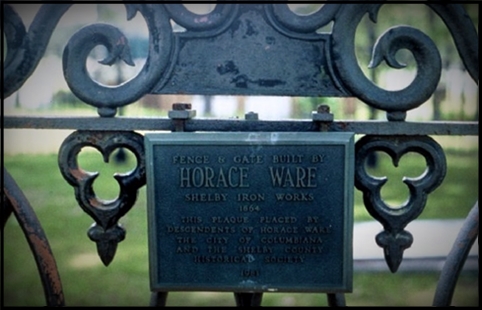 Fence & Gate Built By
Fence & Gate Built By
HORACE WARE
Shelby Iron Works
1864
This Plaque Placed By
Descendents of Horace Ware
The City Of Columbiana
and The Shelby County
Historical Society
1981
Inside this fenced area are the graves of his first wife,
Martha Ann Ware,
and Roxana R. Ware, "Infant daughter of Horace & Martha Ann Ware",
Born November 18, 1852, Died September 23, 1853.
This monument is erected
To The Memory of
Mrs. Martha Ann Ware,
by her bereaved husband Horace Ware.
Mrs. Ware was born in Spartanburg Dist.
S.C. March 19th, 1821,
where her parents Nathaniel and
Mary Woodruff then lived.
She was married June 24th, 1841,
was baptized by Rev. W.H. Carroll
into the Baptist Church in 1856.
Died September 26th, 1862.
Note: Horace Ware married Martha Ann Woodruff
in Bibb County Alabama on June 24, 1841 by
Alexander Smith. Also, buried in
the Smith-Mahan Cemetery, located now in Bibb County Alabama, is
Mary Adallize Ware, "daughter of Horace and Martha Ann Ware", April
7, 1842 ~ September 20, 1845.
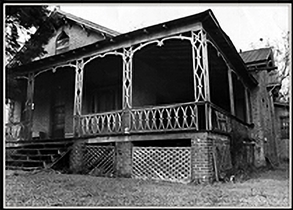 Shelby County Reporter
Shelby County Reporter
Columbiana, Alabama
Wednesday, January 30, 1991
HISTORIC HOME BURNS IN FIRE"
SHELBY. A building of historic significance, which has
been used in recent years to house antiques, was destroyed by fire early Friday
morning.
Although the owner, Robert Waite, has estimated the
uninsured loss of the structure and its contents at $200,000, he said the
community suffered the biggest loss.
The home which had belonged to Shelby Ironworks founder
Horace Ware, would have been part of an historic park that is being created by
the Historic Shelby Society, Waite said.
Built around 1850 by the man who has been called the
chief of the early iron-masters of Alabama, the home has been described by some
historians as the most architecturally unique home in the county.
Waite, who lives in North Shelby, said a Shelby resident
who lives across the road from his antique business heard an explosion around
3:30 a.m. and saw a glow in the sky.
While there was nothing the Shelby Volunteer Fire
Department could do to save the structure, Waite praised the quick response of
the unit and the fact said that the volunteers stayed until 7 a.m. when there
was no longer an danger.
Buddy Rhinehart, one of the 16 volunteer firemen who
answered the call, said that the men and four trucks were on the scene within
two minutes.
He said the structure was fully involved when the firemen
arrived.
Since the fire seemed to have started in the kitchen
area, Waite said he assumed it was caused by the wood burning stove.
However, the stove felt cool to his touch when he had
left around 4 p.m. the previous day, Waite said.
Although everything but the brick facade was destroyed,
Waite said that he hopes to be able to restore the building.
"Handmade bricks were used in the home," he said, "and
the framing lumber was heart pine, which kept the fire burning once it started."
Waite said he plans to bring some of the antiques he has
stored at other locations to sell from a trailer near the burned home site.
Shelby County Reporter
Columbiana, Alabama
Thursday, January 13, 1927
"L & N's LAST RUN WAS MADE MONDAY"
The last run of the Louisville & Nashville passenger
train from Columbiana to Shelby was made Monday, January 10th. On the following
day freight shipments to Columbiana were delivered by the local freight train
from the L & N Mineral.
Columbiana had enjoyed passenger service over the L & N
for a long time and in former years before the day of automobiles, it was a
great convenience to the people. Of recent years the passenger traffic has been
very light, and the railroad had previously made petitions to the public service
commission to discontinue the service.
The road from Columbiana to Shelby was built according to
information furnished the Reporter by W.G. Parker, about 60 years ago by the
Shelby Iron Company to furnish an outlet to them for shipment of their products
over the Southern Railway from Columbiana. That was long before the road from
Calera to Attalla, now known as the L & N Mineral was built. The Shelby Iron
Company owned and operated the road for about 25 years maintaining a sort of
passenger service for a part of that time.
Soon after the construction of the L & N Mineral about 35
years ago, the short line was taken over by the L & N, became a part of that
system and was operated continuously until its last run was made Monday.
Passenger service had not been maintained regularly, however, for more than
twenty years.
Rev. O.W. O'Hara was appointed by the L & N as their
agent at Columbiana in which place he served for a number of years.
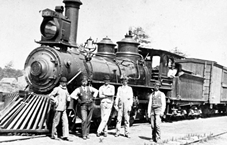 L&N Mineral Local Freight Train
L&N Mineral Local Freight Train
Copyright - Bobby Joe Seales - 2000
|
